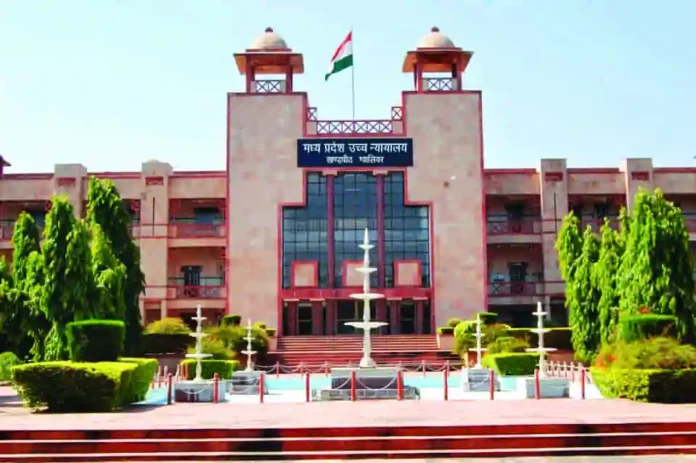On July 23, the Madhya Pradesh High Court gave an important judgment regarding the criminal liability of contractors for not erecting warning signs to commuters regarding culvert widening at construction sites. In a recent incident, this oversight led to the death of a person.
The Court dismissed the application of an applicant seeking quashing an FIR, charge sheet and order taking cognizance of the offense of culpable homicide not amounting to murder. A single-judge bench of Justice GS Ahluwalia heard the petition filed by one PD Agrawal and held that “during the construction activities of shoulders and culverts, all precaution for safety of road users is to be taken in advance with respect to proper traffic signages, flags etc”.
The bench observed that the owner of the construction firm had the duty to ensure safety precautions, including erecting warning signs. Negligence in safety measures directly contributing to a fatal accident can constitute a criminal offense under Section 304-A IPC. An application under Section 482 of the CrPC was filed seeking quashing of an order passed on December 29, 2006, by Sunil Kumar Jain, Judicial Magistrate First Class, Paten, Jabalpur district, in a criminal case where widening of a culvert by the applicant/contractor led to one Charan Singh who was on a motorcycle falling into a ditch and dying.
The contract was originally awarded to TDM Infrastructure Pvt Ltd, who sublet it to M/s PD Agrawal Infrastructure Ltd. The charge sheet was filed under Section 299, CrPC, by declaring the applicant an absconder and ultimately, a warrant of arrest was issued.
However, it was submitted by the counsel for the applicant that he was granted anticipatory bail on November 6, 2006. Thus, the applicant never appeared before the investigating officer or before the trial court, and ultimately he was declared an absconder. The counsel said that however on October 23, 2018, the applicant surrendered before the trial court and the case was adjourned.
Challenging the registration of an FIR against the applicant, his counsel said that as the applicant was the managing director (MD) of the company and the offence was committed by the company, in absence of any provision under the IPC, he cannot be made vicariously liable for the offence committed by the company. It was further submitted that even the company has not been made an accused.
However, the counsel for the State submitted that in the light of the judgment passed by the Supreme Court in Sushil Ansal vs State Through Central Bureau of Investigation, the applicant was the owner of the contractor company and therefore, he can be made an accused. But the applicant said there was nothing on record that the applicant had any role to play in not putting any warning sign on the road to indicate that it was closed.
The Court said that the only question for consideration was whether the applicant could be held criminally liable for not putting warning signs on the spot. It observed that the applicant was granted anticipatory bail in 2006, but never appeared before the investigating officer. Also, the MD was also a partner of M/s PD Agrawal Infrastructure Ltd and therefore, was an owner with a share in the profit.
Furthermore, specific site instructions were given to the contractor to put big coloured banners by putting flags, etc., and that road users should be protected from accidents of any kind. However, nothing was done by the company and the applicant.
The Court said that there is no bar in implementing the company as an offender at a later stage. The Court in exercise of powers under Section 190, 193 and 319 of the CrPC can always summon an additional person as an accused.
The Supreme Court in Bhalchandra and Anr vs The State of Maharashtra observed that criminal negligence is the gross and culpable neglect or failure to exercise reasonable and proper care and precaution to guard against injury either to the public or to an individual in particular. This is after considering all the circumstances out of which the charge has arisen and it was the imperative duty of the accused to have adopted. It was held that criminal negligence can be found in varying sets of circumstances.
The central government is committed to provide benefits to building and other construction workers. Compensation is provided to workers/families of unorganised workers employed in building and other construction works, as per welfare schemes framed and administered by the Building and Other Construction Workers (BOCW) Welfare Board of states/UTs where the workers are registered as beneficiaries.
The provisions of compensation in case of death/injury of unorganised construction workers are also dealt under the Employees Compensation Act, 1923, and the Employee State Insurance Act, 1948. The enforcement and implementation of the employee compensation act lies with the workmen compensation commissioner notified by respective state governments and the ESI Act, 1948 implemented by the Employees’ State Insurance Corporation, which is under the Ministry of Labour and Employment.
The central government also maintains data with respect of Indian workers holding Emigration Check Required passports and proceeding for overseas employment through the e-Migrate portal to 18 ECR countries. In order to ensure their welfare, the government has been implementing the Pravasi Bharatiya Bima Yojana as a mandatory insurance scheme. It provides an insurance cover of Rs 10 lakh in case of accidental death or permanent disability and other benefits, at a nominal premium of Rs 275 (for two years) or Rs 375 (for three years).
—By Adarsh Kumar and India Legal Bureau


